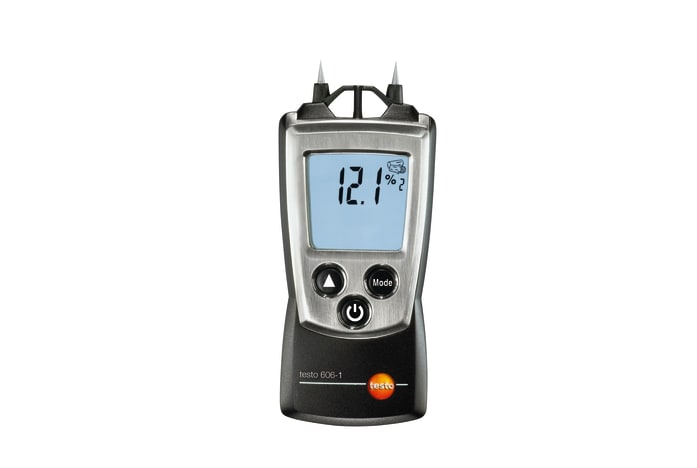The Ultimate Guide to Moisture Meters: A Comprehensive Review and Just How They Can Conserve You Money
In the realm of structure maintenance, building, and various sectors, the importance of properly determining wetness levels can not be overemphasized. Dampness meters offer as crucial devices in detecting and keeping track of moisture content in products, aiding in avoiding pricey damages and guaranteeing the high quality of items. Recognizing the subtleties of various types of dampness meters, their applications, and the possible cost-saving advantages they provide can be a game-changer for services and experts alike. Finding exactly how these tools can not just streamline procedures however also add to monetary savings is a trip worth embarking on.
Kinds Of Wetness Meters
One typical kind is the pin-type dampness meter, which measures the electrical resistance between two pins inserted into a material. Pinless wetness meters, on the various other hand, use electromagnetic sensing unit plates to check a bigger area without creating damages to the material's surface.

Additionally, there are likewise specialty wetness meters developed for particular products like hay, grain, or soil. These meters provide accurate dampness readings tailored to the one-of-a-kind buildings of the material being evaluated. Infrared wetness meters determine the thermal buildings of a material to establish its dampness web content non-invasively, making them helpful for applications where pin or pinless meters might not be suitable. Comprehending the various kinds of moisture meters available can assist markets select the most suitable tool for their certain moisture measurement requirements.

Advantages of Making Use Of Dampness Meters
Moisture meters provide very useful advantages in properly keeping track of and examining dampness degrees in diverse products and settings. One of the key advantages of making use of dampness meters is the prevention of possible damages created by excess wetness.
Additionally, utilizing moisture meters can lead to increased power effectiveness. By determining areas with high dampness degrees, such as leaks or poor insulation, changes can be made to boost energy conservation and lower energy prices. In farming settings, moisture meters play an important role in maximizing plant yields by allowing farmers to monitor dirt wetness levels and make notified irrigation decisions. On the whole, the advantages of utilizing moisture meters extend across various industries, supplying affordable solutions and advertising far better quality assurance practices.
Exactly How to Choose the Right Moisture Meter
When picking a wetness meter, it's necessary to make sure that the meter is appropriate for the particular material you will certainly be screening. Different materials have varying electric residential or commercial properties that can affect dampness analyses, so choosing a meter developed for your material is why not find out more essential for accurate outcomes. By carefully evaluating these factors, you can pick a dampness meter that fulfills your demands and gives exact wetness dimensions for your jobs.
Correct Strategies for Moisture Meter Usage

Cost Cost Savings With Wetness Meter Applications
Just how can the calculated use of wetness meters lead to significant price savings across numerous markets? In the agriculture industry, moisture meters help in figuring out the optimal time for gathering crops, preventing over-drying or here excess moisture that can influence the last product's quality.
Similarly, in building and construction, moisture meters aid prevent costly problems by spotting moisture levels in structure products, such as wood or concrete, which can result in structural issues otherwise attended to promptly. By recognizing problem locations early on, specialists can take corrective procedures to avoid comprehensive repair work or substitutes, ultimately saving money and time.
Additionally, in the food handling industry, wetness meters are important for checking product high quality and making certain compliance with safety and security guidelines. By accurately determining dampness content in foodstuff, manufacturers can stop perishing, preserve freshness, and reduce waste, causing considerable price savings. On the whole, the calculated application of wetness meters is a valuable financial investment that can lead to significant expense decreases and improved efficiency throughout numerous industries.
Final Thought
In conclusion, dampness meters are useful tools for finding and gauging wetness degrees in different products. By making use of the ideal dampness meter and following appropriate strategies, users can effectively stop pricey problems created by excess moisture.
Dampness meters offer as essential tools in detecting and keeping track of moisture content in products, helping in stopping expensive damages and making sure the quality of products. Infrared dampness meters measure the thermal homes of a product to determine its wetness web content non-invasively, making them helpful for applications where pin or pinless meters might not be suitable.Wetness meters offer vital advantages in precisely keeping track of and analyzing moisture degrees in varied materials and environments. In agricultural setups, dampness meters play an essential function in maximizing crop yields by allowing farmers to monitor soil wetness degrees and make informed watering choices.In conclusion, wetness meters are beneficial devices for measuring and finding moisture levels in different products.